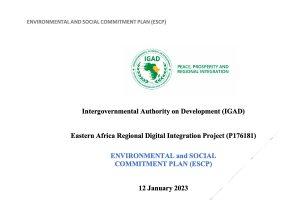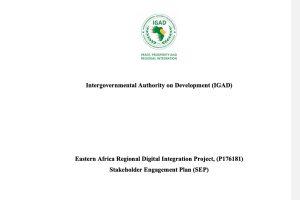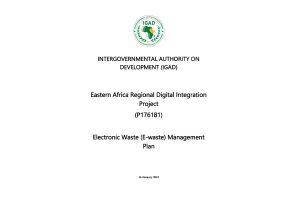Electronic Waste (E-waste) Management Plan
The Intergovernmental Authority on Development (IGAD) Secretariat will manage environmental and social risks and impacts of the project throughout the project life cycle in a systematic manner, proportionate to the nature and scale of the project and to the potential risks and impacts. The generation of waste is one of those risks that must be considered during the preplanning and implementation phases of the project. Waste management planning for the project should be conducted early as possible to identify sound management practices and procedures within legal and environmental frameworks. Possible waste streams that may be generated during project implementation may include electrical and electronic waste. However, the focus of this plan is on electronic waste or E-waste. An E-Waste Management Plan (EWMP) is used to describe the waste management related issues within the Electric and Electronic Equipment (EEE) industry sector and specify the best way to address these issues, giving specific actions, targets, and timeframes. This E-waste management plan should be implemented throughout the project’s lifecycle to protect the environment, biodiversity, and habitats, safeguard the health of the local communities and comply with The World Bank Environment, Safety and Health Guidelines (ESHG), and with the Environmental Protection and Social Legislations and Procedures in the Republic of Djibouti
 Environmental and Social Commitment Plan (ESCP)
Environmental and Social Commitment Plan (ESCP)
The Intergovernmental Authority on Development (IGAD) (the Recipient) will implement and coordinate activities at the regional level for the Eastern Africa Regional Digital Integration Project (P176181) (the Project), as set out in the Grant Agreement. The International Development Association (the Association) has agreed to provide financing for the Project, as set out in the referred agreement.
The Recipient shall ensure that the Project is carried out in accordance with the Environmental and Social Standards (ESSs) and this Environmental and Social Commitment Plan (ESCP), in a manner acceptable to the Association. The ESCP is a part of the Grant Agreement. Unless otherwise defined in this ESCP, capitalized terms used in this ESCP have the meanings ascribed to them in the referred agreement.
Without limitation to the foregoing, this ESCP sets out material measures and actions that the Recipient shall carry out or cause to be carried out, including, as applicable, the timeframes of the actions and measures, institutional, staffing, training, monitoring and reporting arrangements, and grievance management. This ESCP also sets out the environmental and social (E&S) instruments that shall be adopted and implemented under the Project, all of which shall be subject to prior consultation and disclosure, consistent with the ESS, and in form and substance, and in a manner acceptable to the Association. Once adopted, said E&S instruments may be revised from time to time with prior written agreement by the Association.
Click Here to Download the Environmental and Social Commitment Plan (ESCP) in PDF
 Eastern Africa Regional Digital Integration Project, (P176181) Stakeholder Engagement Plan (SEP)
Eastern Africa Regional Digital Integration Project, (P176181) Stakeholder Engagement Plan (SEP)
IGAD recognizes the importance of open and transparent engagement with project stakeholders as an essential element of good practice. Effective engagement with the stakeholders is expected to improve the environmental and social sustainability of the project, and as well enhance the project acceptance and make a significant contribution to successful project design and implementation.
This Stakeholder Engagement Plan aims to ensure a systematic, consistent, comprehensive and coordinated approach to stakeholder participation and communication throughout the project cycle. The SEP outlines ways in which the project team will communicate with stakeholders and feedback mechanisms to be utilised. The plan will guide timely engagement with key stakeholders as well as dissemination and increased access to relevant project information.
The project will innovate ways for consultations to be effective and meaningful to project and stakeholder needs while considering Covid-19 restrictions. Strategies to be employed include virtual and physical meetings, phone calls, and emails.
The objectives of information dissemination and consultations under the EA-RDIP are: (a) understanding of the digital concerns of stakeholders in the IGAD region; (b) reception of feedback and comments as well as grievances from all stakeholders on project design and implementation; (c) feedback on potential environmental and social risks and impacts and mitigation measures; (d) provision of regular information to stakeholders related to project implementation progress and any other emerging issues throughout the project cycle; and (e) provision of transparent and accountable mechanisms on all aspects of the project implementation.
Click Here to Download the IGAD Stakeholder Engagement Plan (SEP) in PDF
Send us your feedback by filling the text area below
[fc id=’19’][/fc]

